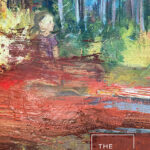excerpt from “Confetti” by Marilyn Abildskov
1 I ask them what they think about. Truly, whatever’s on your mind. Write it down. Anonymously....
Read MorePosted by Cincinnati Review | Aug 1, 2019 | Samples
1 I ask them what they think about. Truly, whatever’s on your mind. Write it down. Anonymously....
Read MorePosted by Cincinnati Review | Jul 31, 2019 | miCRo
From cars to cocktail napkins to Hennessy bottles, these snapshots create a coming-of-age story rich with heart and heartbreak.
Read MorePosted by Cincinnati Review | Jul 25, 2019 | From our Contributors
In Issue 16.1, our literary nonfiction offerings include Emily Block’s essay “Fog Studies,” which meditatively explores many different aspects and meanings of “fog.”
Read MorePosted by Cincinnati Review | Jul 24, 2019 | miCRo
When the speaker discovers that “wisdom teeth” in English translates to “love teeth” in Korean, the poem unspools into a stunning reflection on false translation and the gap between culture and identity.
Read MorePosted by Cincinnati Review | Jul 17, 2019 | miCRo
Geosits’s prose spans decades and moves the reader from “bug screens” in the Philippines to “Filet-o-Fish sandwiches” in America.
Read MorePosted by Cincinnati Review | Jul 10, 2019 | miCRo
“Epigenetic Inheritance” explores the stakes and fallout of inherited trauma, how we retain its traces in our cells and pass it down.
Read MorePosted by Cincinnati Review | Jul 3, 2019 | miCRo
Beyond the pleasure and surprise of such a fresh occasion for poetry, “Music Indoors” makes exemplary use of lush, atmospheric imagery and a slow, lingering pace to cultivate a kind of sun-drenched, Debussy-soundtracked pocket world…
Read MorePosted by Cincinnati Review | Jun 27, 2019 | What We're Reading
Making a case for what he terms “liquid poetics,” Hayes suggests that great art comes from the ability to stay loose, to change tacks, to shape shift in response to these shifting, mysterious factors. Hayes’ sustained emphasis on personal poetics as both liquid and descendant creates a way for his readers (colleagues, family, fans) to find themselves within the fluctuating matrix he proposes.
Read MorePosted by Cincinnati Review | Jun 26, 2019 | miCRo
This juicy work of microfiction feels like the perfect tale to tell in the dark, with a flashlight under your chin.
Read MorePosted by Cincinnati Review | Jun 19, 2019 | miCRo
This sensuous, image-rich poem engages with the pleasures of driving down back roads, as it marvels at the passage of time and the body’s relationship to the landscape that shapes it.
Read More




